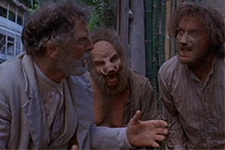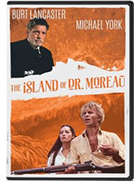The Island of Dr. Moreau
|  Don Taylor’s The Island of Dr. Moreau was the second official adaptation of H.G. Wells’s 1896 novel, following Island of Lost Souls, Erle C. Kenton disturbing 1932 version starring Charles Laughton and Bela Lugosi. Taylor’s adaption is significantly slicker and more commercial than Kenton’s, which was a box office failure in the early ’30s largely because it struck audiences at the time as too gruesome, disconcerting, and tasteless. Taylor was, of course, working in an entirely different era, following more than a decade of the horror genre mining new extremes in violence, gore, and shock images, so if anything his version seems positively restrained by comparison. Screenwriters Al Ramrus and John Herman Shaner, who had previously collaborated on the inner-city school drama Halls of Anger (1970), as well as several science fiction and Western television series in the 1960s, stick to the broad narrative in Wells’s novel, opening with a British sailor named Andrew Braddock (Michael York) being washed ashore on a remote South Seas island after a shipwreck. He finds himself in the hands of the island’s owner, Dr. Paul Moreau (Burt Lancaster), a scientist who has removed himself from the world in order to pursue his controversial research. Moreau is assisted by an alcoholic mercenary named Montgomery (Nigel Davenport) and has as his constant companion a beautiful young woman named Maria (Barbara Carrera), who soon turns her attention to the younger, more virile Braddock even as she confesses that she can never leave. There are other residents of the island, as well, which Braddock eventually learns are the results of Moreau’s attempts to isolate a particular chromosome that determines the shape of every living thing. Through chemistry and surgery, Moreau has been literally turning animals into approximations of human beings, many of which subsist in a nebulous space in between, bearing physical characteristics of both humans and the animals they once were (lions, bears, bulls, hyenas) and attempting to adhere to a series of laws (not walking on all fours, not killing) that keep them from reverting to their animal natures. Moreau’s laboratory is understandably referred to as the “House of Pain,” and whenever one of the laws is broken, the law-breaker must return there for further, painful modification. Lancaster’s portrayal of Moreau has understandably been compared to Charles Laughton’s in Island of Lost Souls, as the two actors have largely different takes on the character. Laughton’s performance was much more dramatic—a delirious, scenery-chewing mix of sadism, imperialism, and a runaway God complex. It’s one of the great villainous performances, and Lancaster can’t be faulted for trying to take the character in a more subdued, some might say “realistic,” direction. His Moreau is not an outright villain like Laughton’s, but rather a scientist who, in the genuine pursuit of improving life, has sold his soul to experimentation. There is something slightly exhausted and desperate about him, which we can see in his gray beard and dingy, rumbled white suit, which contrasts with the crisp, bright white suit worn by Laughton and his wicked black hair and sharp goatee (both suits are obvious signifiers of colonialism, but Lancaster’s is worn and at the end of its life). Moreau becomes more outwardly violent toward the end, but for the much of the film he is a reserved voice who has long since justified the pain he inflicts in the name of science. Lancaster’s more subdued approach to Moreau doesn’t give Michael York, who had already worked with Franco Zefferelli (1968’s Romeo and Juliet, 1977’s Jesus of Nazareth), Bob Fosse (1972’s Cabaret), and Sidney Lumet (1974’s Murder on the Orient Express), much to work with, and as a result Braddock never feels particularly interesting. His romance with Maria generates only a moderate amount of heat, and the film doesn’t get really interesting until the screenplay deviates from Wells’s novel by having Moreau experiment on Braddock to turn him into an animal. It’s a fairly preposterous turn of events, but it gives the film a much needed jolt of life. The Island of Dr. Moreau has always had a certain notoriety. When Wells first published the novel in the late 19th century, its depictions of vivisection and philosophical questions about evolution, the nature of humanity, and our conflicted relationship to nature connected it with a number of hot-button scientific and moral issues in Europe. Kenton’s film version, as noted earlier, failed with audiences due to its gruesome and unsettling content and was actually banned for years in a number of countries, including England. There was no such risk with Taylor’s version, which despite taking advantage of new developments in make-up special effects and featuring a number of grisly scenes, never feels like much of a challenge to our sensibilities. Taylor, who began his career as an actor before shifting behind the camera, was an experienced director, having helmed Escape From the Planet of the Apes (1971) and the musical Tom Sawyer (1973). However, the majority of his work had been in television, where he had directed episodes in dozens of anthology and episodic series of virtually every genre imaginable, including The Rifleman, Burke’s Law, Alfred Hitchcock Presents, and Night Gallery. That is perhaps why The Island of Dr. Moreau feels more like a made-for-television film than a theatrical feature, despite the lush widescreen cinematography by Gerry Fisher (Aces High) and relatively large-scale action sequences, including several that involve stuntmen fighting hand-to-paws-and-jaws with various wild animals, including a lion and a tiger. The relative flatness of the film, despite its potentially unsettling subject matter, may also be partially explained by its being a product of Samuel Z. Arkoff’s American International Pictures, the low-production company that specialized in profitable drive-in shlock in the 1950s and ’60s and was attempting to expand its range in the 1970s. The Island of Dr. Moreau was actually the company’s third Wells adaptation in two years, following the ridiculous The Food of the Gods (1976) and Empire of the Ants (1977), both of which were directed by cult favorite Bert I. Gordon, who was nicknamed “Mr. B.I.G.” for his taste in stories featuring abnormally large people and animals. Taylor’s film is certainly the more respectable of that particular triumvirate, although that’s not saying much. It is also better than the disastrous adaptation that would arrive 19 years later courtesy of director John Frankenheimer and stars Marlon Brando and Val Kilmer, although that might be saying even less.
Copyright © 2017 James Kendrick Thoughts? E-mail James Kendrick All images copyright © Olive Films | |||||||||||||||||||||||||||||||
Overall Rating: 

 (2.5)
(2.5)


